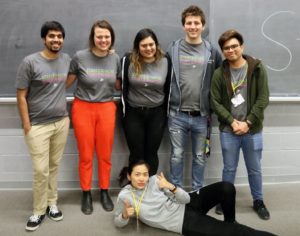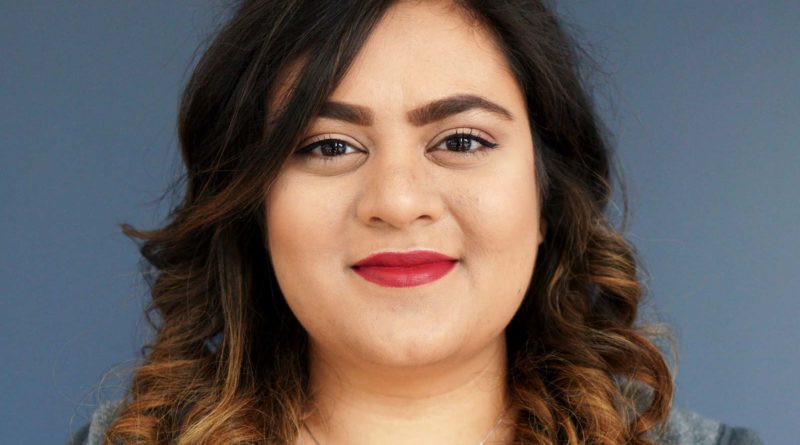Marium Kirmani – StarterHacks
Marium Kirmani knows what makes a hackathon great.
No matter how hard she tries, she can’t stop herself from jotting down what goes well and what could be better at each one she attends.
She’s a co-founder of StarterHacks, a hackathon focused on diversity and inclusion for people new to the concept, and she doesn’t come from what she calls a typical hackathon background – computer science and engineering. When she attended her first one, she was studying Health Informatics at the University of Waterloo and had no experience coding.
“One of my friends, he used Terminal to open a file once, which is a super easy thing to do, but at that point I knew nothing about coding or computers or anything,” she says. “I was like, what is this magic?”
The idea of taking that kind of control over a computer fascinated her, so she started looking into computer science courses.
That’s when that same friend recommended she try a hackathon.
“He knew that I’m the kind of person who wants to get in and get my hands dirty,” she says. And while she didn’t end up making anything in her first 48 hours, she did walk away with a lot of knowledge she didn’t have before.
But as Marium started attending more hackathons, she noticed two things. First, she was one of the only women who showed up to the events. Second, with her non-tech background, she didn’t always feel welcome.
“A lot of them are very intimidating to go to,” she says. “I’d get this vibe that I wasn’t completely welcomed because I wasn’t from an engineering background. I would go to join teams and they’d say, ‘oh, why are you here?’”
She shared those experiences and feelings with five fellow residence dons and friends – William Nippard, Daniel Samyn, Jessica Tam, Ben Che and Chirag Gada – and they agreed that there’s a stigma that needed to be overcome. That’s when they challenged each other to put together a new kind of hackathon, in just five weeks.
To test the idea, she went one of her professors. He loved it from the start, and gave them the connections they needed to bring mentors and sponsors on board.
Three weeks in, the StarterHacks team launched their marketing and released their app. “It got a bit scary,” she says. “Before that we were just trying to reach out to sponsors to see if we would have the money.”
Now it was real.
Then came the hackathon itself. They picked five problem areas – social impact, everyday life, environment, commerce, and community – and spent the next 48 hours, from March 11 to March 12, 2017, finding solutions.
“It ended up being a really good experience,” Marium remembers. “When we did our applications, it was a blind process. When we got to the event, we noticed, hey, there’s a lot of girls here. Cool! Then we did our stats and we were at 48 per cent.”
If nothing else, that encouraged them to host their second hackathon last March. “We need to keep this going, if not for getting more academically diverse people interested but this seems to be a good outlet for women, and it seems to be engaging more women to come out to the event.”

So what makes StarterHacks so different that they’re able to achieve numbers like this?
For one, their introduced three different streams into their program. Participants choose whether they want to be on a design steam focusing on user experience and graphics, the coding steam that creates the software components, or the business steam that handles the pitching and business planning.
Before the hacking begins, they hold workshops to give all participants of each stream the working knowledge they’ll need, so no one will feel like they don’t belong.
“One of the things we wanted to do with StarterHacks is make sure that those parts of tech are represented because a lot of times, especially with hackathons, they’re kind of shoved to the side,” Marium explains.
And it’s great for people who want to see how the other areas work, or who are interested in trying something new.
“You can explore. You can go into the business stream even if you have an engineering background because it’s something you want to explore. And you can go do design stream even if you have never been in design,” she says. “You want to figure out if that’s the right fit for you, so you have a 48-hour, two-day weekend to just try it out.”
With the addition of mentors from all stages of employment and industries, she’s hoping to help students – especially those in high school or early university, though all are welcome – a helping hand in figuring out what they’d like to do once they graduate. “We have about a 1:5 ratio of mentors to hackers,” she adds.
Marium herself has found her calling through hackathons. Not only did it bring her out of her comfort zone, but it let her try out a few skillsets to see what stuck.
“I’d be the person who’d pitch, I’d be the person to design the app or whatever we were making ,and then my friends or the people I’d meet at the hackathons would be the people who did the engineering part of it.
“It helped me focus in on what I want to do in life.”
Learn more at:
https://starterhacks.ca/

